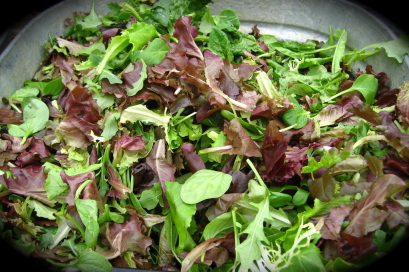"They're super foods"*
 Tuesday, August 28, 2007
Tuesday, August 28, 2007

While I was writing the draft of this post, I realized that despite the name of my blog, neither greens nor berries have yet been a topic of a post. Here is a feature article from the online version of the Nutrition Action Healthletter on how eating leafy greens benefits our eyes, bones, brains and other body parts' longevity and integrity:
(*Tufts University researcher, Katherine Tucker, referring to leafy green vegetables in the linked article.)
Credit: photo of Mesclun mix by random duck used under this Creative Commons license.